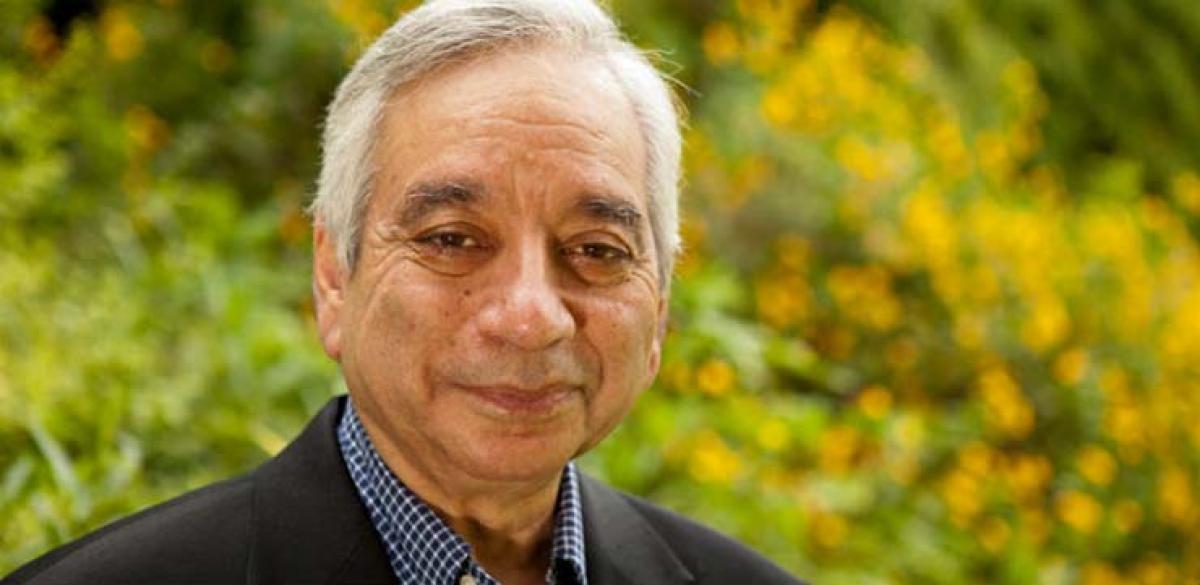Live
- Alia Bhatt captures attention in white
- Varun Dhawan talks about ‘Baby John’
- ‘Moonwalk’ trailer promises a quirky heist, love, and loyalty
- Combat leaf spot disease
- Ahsaas Channaopens up about her complex character in ‘Mismatched 3’
- Radhika Apte welcomes first child, shares heartfelt post
- Jacqueline dazzles at Da-Bangg Reloaded concert
- Time to boost measures to prevent drowning, save children: WHO
- TDP achieves milestone with 73 lakhs membership registration, says Chandrababu
- South Korea: Main Oppn hails Yoon's impeachment motion passage as 'victory for people, democracy'
Just In

Indian Conservation Biologist Elected Fellow Of Royal Society. Noted Indian conservation biologist Kamal Bawa will be formally admitted to the prestigious Royal Society as a fellow on July 10 for his \"pioneering contributions to understanding the population biology of tropical forest trees\".
Washington: Noted Indian conservation biologist Kamal Bawa will be formally admitted to the prestigious Royal Society as a fellow on July 10 for his "pioneering contributions to understanding the population biology of tropical forest trees".
.jpg)
India-born Bawa, an internationally recognised evolutionary ecologist and a distinguished professor of biology at the University of Massachusetts, Boston, was elected a fellow of the London-based society in April, according to a university media release.
Bawa joins former and current fellows such as Isaac Newton, Charles Darwin, Albert Einstein, Stephen Hawking, and about 80 Nobel laureates.
Established in 1660, each year the Royal Society's existing fellowship proposes about 700 candidates for election, and then elects up to 52 fellows from England and the Commonwealth countries, and up to 10 foreign fellows.
Bawa's "pioneering contributions to understanding the population biology of tropical forest trees led to new strategies for their conservation, and also for the sustainable use of non-timber forest products", read a statement published on the society website.
"On this base he has provided leadership in conservation science in India by establishing ATREE, an influential NGO that generates interdisciplinary knowledge, guides policy making, disseminates information, and builds human capacity in biodiversity science.
"Through his work and popular writing Kamal Bawa, has promoted international cooperation in science, while also strengthening biodiversity awareness and public support for conservation in Indian civil society," it said.
"I am interested in developing new paradigms of conversation that take into account the need to alleviate poverty in biodiversity-rich areas through sustainable use of biodiversity," said Bawa.
Bawa noted that there was considerable debate about the success of integrated conservation and development projects in meeting the twin goals of conservation and poverty reduction.
Work on sustainable livelihoods at several sites in the Eastern Himalayas tests whether conservation and biodiversity can be enhanced while alleviating poverty, he said.
His approach is to quantify changes in economic and social parameters resulting from economic and institutional interventions, Bawa said.
Data are analysed and findings integrated with results from other similar projects both within and outside South Asia.
"Kamal Bawa's election as a fellow of the Royal Society further validates the critical importance of his contributions to and legacy as one of the chief founders of the field of sustainability," said Massachusetts University Chancellor J. Keith Motley.

© 2024 Hyderabad Media House Limited/The Hans India. All rights reserved. Powered by hocalwire.com







